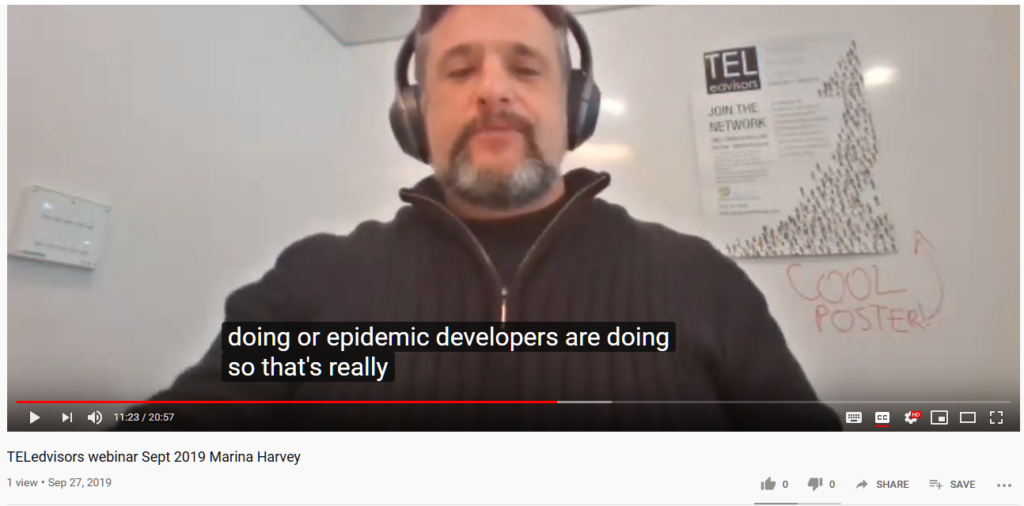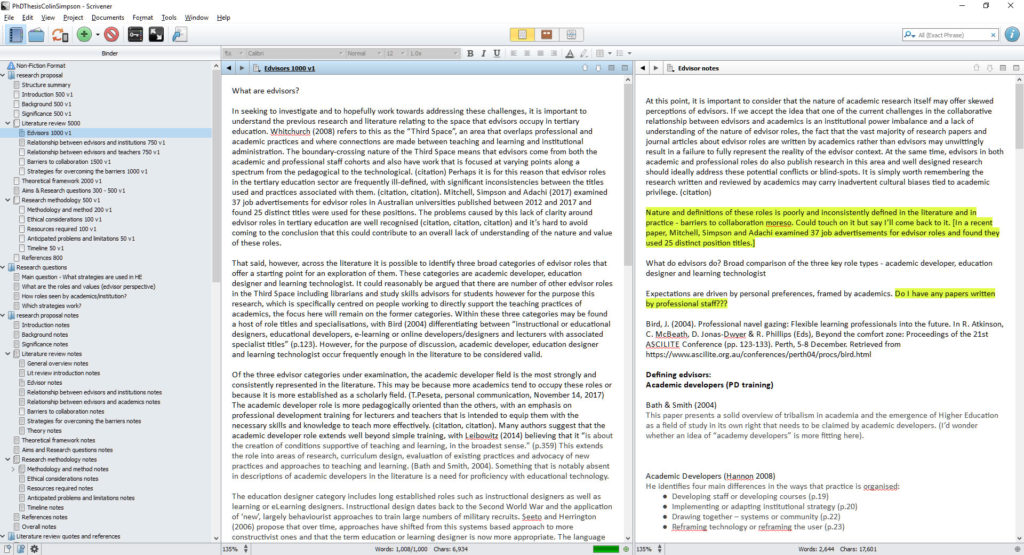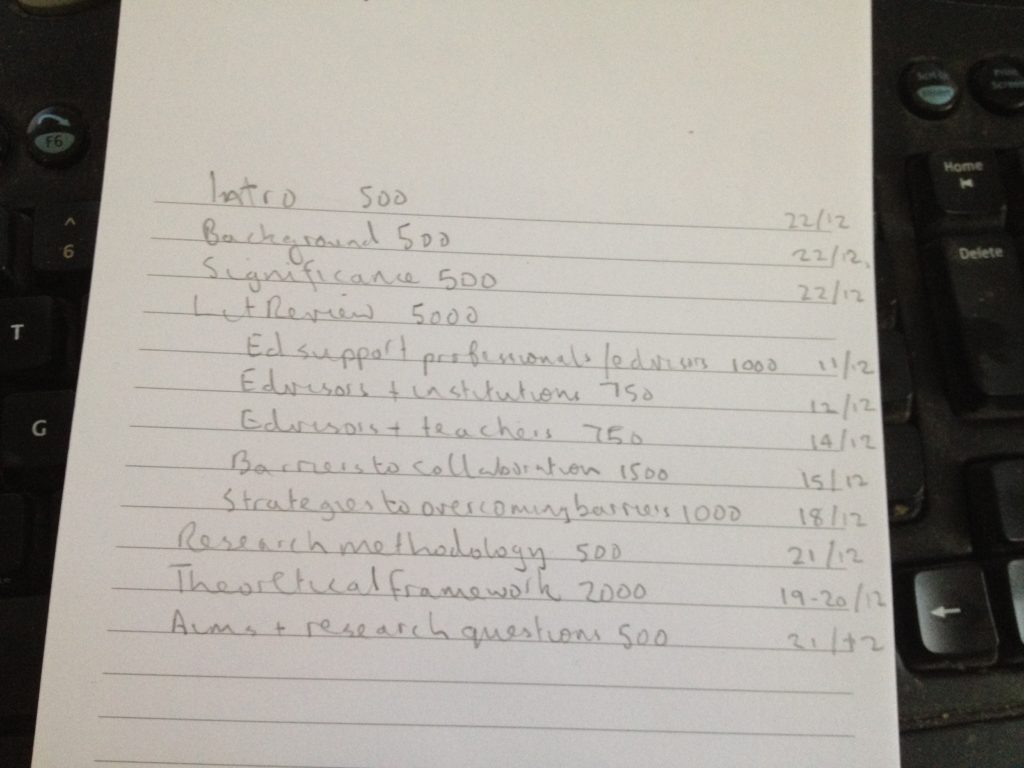In some ways this is a ‘thoughts on thoughts on’ as I’m writing about Tai Peseta’s summary reflection at the end of a special issue of the International Journal of Academic Development focusing on the politics of academic development. Specifically, it asked writers to respond to this theme:
amid the array of contested and politically difficult agendas, how do academic developers enact and imagine a future for themselves (and the profession) in ways that recognise and take seriously the business of their own political power, and in particular, their responsibility to speak truth to power (p.65)
I’ve been going to IJAD a lot in my reading because of those that I consider to be the three main edvisor roles – academic developer, education designer and learning technologist – it is academic developers that appear to dominate the research space. Which does make me wonder whether it is a role that is more dominated by people in academic (rather than professional) positions than the other two. Something I’ll be keeping an eye on.
The more time I spend looking at this particular role-type, the more I’m seeing the terms academic and educational developer used interchangeably, which doesn’t help my current line of thinking about education designers/developers primarily as people working with academics to design and built learning resources and online course sites. However it does fortunately still work with my other ideas that titles in the edvisor domain are all over the shop.
Anyway, much of this is by the by. Peseta elegantly ties together the core ideas of five papers about academic developer practice across Europe, Canada and Australia into a wider discussion about how much power or influence ADs can or should exert in their institutions. The broad tone is that this power is far more than I have personally seen but she does note that there can often be a tendency in these kinds of papers to be slightly celebratory and overstate things.
A second reading however is that while the collaboration portrayed in this account contains all the hallmarks of a cautious victory narrative, there remains an underlying question about the possible kinds of representation of academic development initiatives. In reflecting on our modes of justification, I find myself asking who is offering this story? How is the discursive field organised to enable this particular account of it?My goal is not to be cynical but rather to open up the spaces and meanings that illustrate the spectacle of academic development’s political power (p.67)
This mention of cynicism in particular brings me to what I found to be one of the most interesting parts of the author’s reflection. I must confess that in working in an environment where cynicism seemingly abounds, it is easy to travel down the same path. When mystifying decisions are handed down from on high with minimal or laughable consultation, information is fearfully hoarded by people that lack the capacity to use it well and there is a generally pervasive belief that most people don’t care about teaching and learning (vs research), it can seem like a natural progression to simply go with the cynical flow. Fortunately my job leads me more often than not to those people who do care about education and who are capable, so this at least tempers those inclinations.
It was revealing to see today in the results of the National Tertiary Education Union survey of 13500 university workers that only 27% expressed confidence in the people who run their various institutions. Sadly, clearly cynicism is the dominant culture. When we get to this state, I suspect that our ability to understand and empathise with the people that we work with and the cycle only worsens. Peseta discusses the Polish study in this issue where educational reform leaders described three institutional responses to change and characterised academics variously as:
…traditionalists, individualists, unaware, in pain, irrational, lazy, or inert. Each of these three logics permeates the policies of academic development in different ways with different reasons and leads to any number of reactions about the merits of institutional initiatives: pernicious, naive, neutral, welcome, celebratory and necessary. What is to be (or has been) our response to the contradictory reactions about our work as academic developers? What conceptual tools are at our disposal to understand the origins of these perceptions and to see arguments about them as a necessary part of an academic developer’s political repertoire. (p.67-68)
There are some big ideas to unpack in this. The educational reform leaders in this study may well be right in their summary of many of the academics that they have tried to work with but they may equally have misunderstood what has led to these behaviours. They may be grossly oversimplifying the nature of their academics, which is a human thing to do when we find ourselves in opposition to someone who doesn’t share our vision. Their rejection of this vision then calls our own abilities into question and so rather than interrogate those, it’s far more comforting to attribute resistance to lesser personal qualities. (Which isn’t to say that they can’t be present as well, just to complicate matters).
At the heart of these issues (for ADs) I would suggest is the triangular relationship between institutional management, academics and academic developers. ADs are routinely forced into a position where they are tasked with effectively driving compliance to institutional policies and initiatives by offering training in ‘doing things the new/right way’ or trying to advocate best practices to the powers that be. This, to me, seems to be the issue of where and whether ADs should assert their political power. When things take the former route
Too heavy an emphasis on compliance without critical engagement leads to dull, bureaucratic box-ticking , and effectively hollows out academic development of its intellectual contribution. Similarly, accepting and lamenting resistance without considered debate or challenges entrenches tradition unthinkingly. Although both positions are productive and necessary for academic development to flourish as a critical encounter, they each contain an uneasy energy characteristic of Di Napoli’s (2014) agonistic spaces. Yet is in in precisely these spaces tha academic developers realise and grasp the power they have to form and practise their judgement, developing a feel for the game and what it means to be in it. In these spaces, the question which usually lurks is ‘what do I do with the power and influence I have?’ (p.66)
This is also perhaps where Peseta and I diverge a little – and I’ll readily accept that my experience in Higher Ed is limited to one institution – but, as a professional staff member, I’ve never had a feeling of any political power. This may simply be a reflection of my particular context or my lack of experience in politicking and the fact that the author and most of the authors of the papers in the special issue do feel that they have some degree of power has to make me wonder if ‘it’s not you, it’s me’. So this in itself has been something of a breakthrough in some ways and is giving me a lot to consider.
The author and the authors of the papers in the special issue spell out a number of strategic approaches to developing and exercising their power that are worth exploring. Many of them seem highly valuable but a handful I’d question.
From them we learn something about how teaching and learning issues unfold into urgent institutional problems; we develop an insight into the different ways academic developers read the rhythms of their contexts, draw on research, assemble arguments, and galvanise people and resources to reformulate and address the challenges before them. Most importantly, we get a sense of how a particular course of action is justified and argued for over others (p.67)
This to me positions ADs as providers of frank and fearless advice that draws on scholarly practices that senior academics and institutional management (generally the same thing) are more likely to respond to. It puts advocacy front and centre (alongside research) as a key practice of ADs. This is something that I’ve rarely seen specifically listed in job advertisements and position descriptions for these kinds of roles, although maybe it sits under ‘advise’. This certainly lends weight to my feeling that Peseta and the other authors largely see AD roles as being occupied by academics. This is extended in the discussion of the Norwegian paper
… we are privy to the insights of a very experienced group of academic developers and this shows in several ways: in their description of the political context and their participation in it; in their deployment of expertise (institutional know-how and educational research); their sense of what to argue for and what to withdraw from; and more generally, in the way they understand the possibilities and limits of academic development (through their choice of a sense-making framework: discursive institutionalism. This piece really shines when the sense-making apparatus kicks in: levels of ideas (policy, programme and philosophy); types of discourses (coordinative and communicative); and types of ideas (cognitive and normative)… It seems to me that one of the compelling lessons from this paper is about inducting academic developers into the scholarship of the field as an opportunity to debate and defend a set of views about higher education (p.68) (emphasis mine)
This quote leaves me a little unclear as to whether Peseta is suggesting that ADs should be inducted into the scholarship of the discipline being taught or broader scholarship about teaching and learning. (That’ll teach me to only read a summary of a paper and not the paper itself. Fear not, it’s on the long list). One question or idea that has come up a number of times in discussions within the TELedvisor community is whether academics need to better understand what edvisors do but I can see a strong case for going the other way. (Even when we assume that we know). If it is about delving into disciplinary scholarship (e.g. microeconomics) I’m less convinced, as much for the sheer feasibility of it all. Maybe being to ask questions about approaches to teaching and learning that align better to disciplinary practices and scholarship is a practical middle-ground.
Moving on to the study in the special issue by Debowski, Peseta notes a different strategic approach being taken by Australian ADs.
We find an Australian academic development scene keen on a model of partnership with its political allies: from external quality agencies to teaching and learning funding bodies. The politicisation is plausible enough but the distributed nature of the political game carries noteworthy and worrying epistemological effects. The first is that the job of academic development shifts to one of ‘translation’ and ‘implementation’, suggesting in part that the intellectual puzzles of learning and teaching in higher education have more or less been settled. Moreover the thorny and substantial issue of what (and whose) knowledge is being ‘translated’ and ‘implemented’ is left unattended. A second effect is tying oneself too closely to the external political game is that it can divert attention away from a commitment to the project of knowledge-making. (p.68)
Part of me has to wonder whether this different approach – between Norway and Australia – is reflective of national cultural characteristics or if it is simply a matter of the specific examples being examined. If my feeling that ADs don’t carry a lot of power in Australia is widely true, it would make more sense to lean on other authorities to help get things done.
Peseta draws her reflection to a close by reasonably asking
whether academic developers are eager to imagine themselves in the role of steward, where there is a job to be done in caring for the field – its history, ethics and politics – in ways that are future looking. It does seem to me that a condition of scholarship lies in academic developers’ disposition to scholarliness and scholarship, as well as a desire to know and immerse themselves in the peculiarities that comprise the field. If we are to better support academic developers in navigating the messy politics of the agency game, then we need more occasions to dispute, debate and deliberate on what it is that we offer learning and teaching in higher education. We need occasions to test our politics with others in and outside of the field. (p.69)
I would love to see this happening but having had a taste of institutional and academic culture where this absolutely does not happen, I can completely understand ADs wanting this but choosing to spare themselves from banging their heads against a brick wall. (And I thought I was going to be less cynical in this post). Maybe banging our heads against walls is a necessary part of a practice though.
I’ll wrap this post up with one more quote that I want to include but couldn’t find a way to fit into the discussion. I’ll certainly be reading more of this special issue as it clearly speaks directly to my research and hopefully I can also use it to spark wider discussion in the TELedvisor community.
What feels fresh and thrilling to me is that the lens of political ontology unlocks two important aspects of the work. First, it draws attention to the matter of justificatory politics, inviting us to interrupt the discourses that structure the accounts of our work as academic developers. While institutional capture provides academic development with much sought-after leverage and profile, it has the uncanny effect too of infantilising academic developers’ professional imagination such that our identities, values and actions can appear to outsiders as inseparable from what an institution requires. Second, the focus on ontology locates these interruptions as individual and collective acts of political agency, inciting us to lead more public conversations about our values at exactly the time when higher education’s purpose has multiplied. Without these conversations, there may be a temptation to position academic developers flexible and enterprising operators advocating on behalf of greedy institutions (Sullivan, 2003) regardless of their own professional and personal values. Many of us would baulk at this suggestion while reflecting on its distinct likelihood (p.66)
No punches pulled there.



